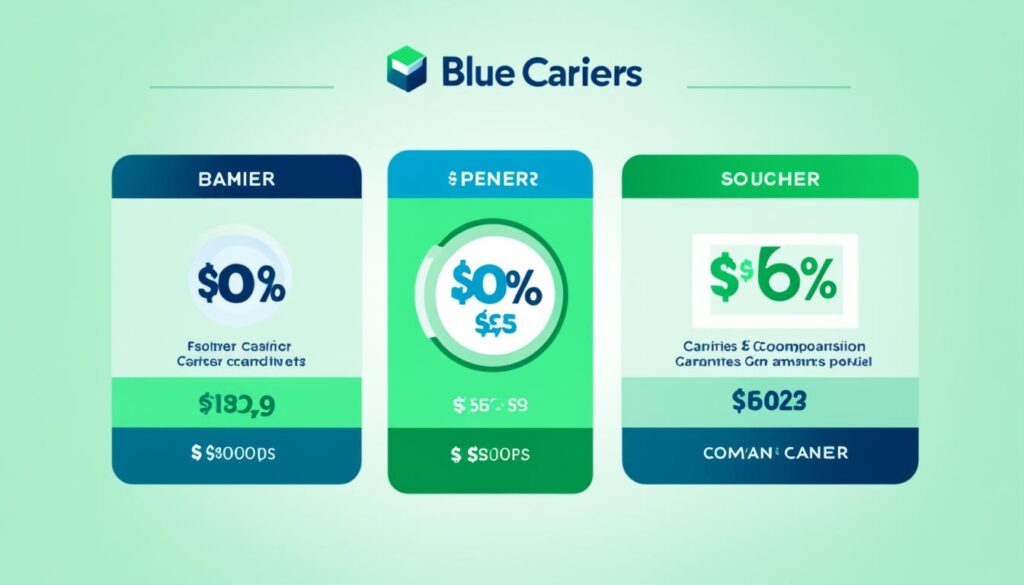Shipping costs can be a significant expense for businesses of all sizes, but there are ways to save. Carrier cost comparison tools are your solution to comparing prices and services offered by different carriers. These online platforms or software are designed to help you make informed decisions, save money, and streamline your shipping processes.
Key Takeaways:
- Carrier cost comparison tools are online platforms or software that allow you to compare costs and services offered by various carriers.
- By comparing carrier costs, you can identify cost-saving opportunities and reduce overall shipping expenses.
- Carrier cost comparison tools save you time by eliminating the need to manually gather quotes from multiple carriers.
- Consider factors like service quality, transit times, and additional fees when comparing carrier costs.
- Verify that the information presented by carrier cost comparison tools is accurate and up-to-date.
Understanding the Importance of Comparing Carrier Costs
When it comes to shipping, every business wants to ensure that they are receiving the best rates and services possible. This is where comparing carrier costs becomes crucial.
By analyzing carrier prices, businesses can identify cost-saving opportunities, find the most competitive rates, and reduce overall shipping expenses. Shipping expenses can quickly add up, and by choosing the wrong carrier, businesses can end up spending significantly more than necessary.
There are numerous factors to consider when evaluating carrier costs, such as transit times, service quality, insurance options, tracking capabilities, and additional fees associated with specific carriers. By taking these factors into account and comparing carrier costs, businesses can make informed decisions that optimize cost-savings and meet their specific shipping requirements.
Carrier cost comparison tools streamline the process of comparing carrier costs, providing businesses with valuable insights into pricing, transit times, and additional services. These tools allow businesses to quickly compare and choose the most cost-effective shipping solution.
What Are Carrier Cost Comparison Tools?
In the world of logistics, shipping rates can vary widely. To mitigate these expenses, businesses often rely on carrier cost comparison tools to find the most cost-effective shipping solutions. These online platforms or software allow you to input shipment details and quickly compare the costs and services offered by various carriers. By leveraging carrier cost comparison tools, you can gain valuable insights into pricing, transit times, and additional services, making it easier for you to make informed decisions.
While the functionality of each carrier cost comparison tool may vary, they generally provide similar features and benefits – they help you identify carriers that offer discounted rates, negotiate better contracts, and accurately analyze shipping costs over time.
How Do Carrier Cost Analyzer and Carrier Cost Calculator Work?
Carrier cost analyzer and carrier cost calculator are subtypes of carrier cost comparison tools. The main difference is that these subtypes enable more in-depth analyses of carrier costs.
Carrier cost analyzers allow you to evaluate the actual expenses associated with shipping, such as fuel surcharges and accessorial fees, which aren’t always factored into initial quotes. Meanwhile, carrier cost calculators help you estimate costs for specific shipments, taking into account delivery deadlines and other constraints.
How Do Carrier Cost Comparison Tools Work?
Carrier cost comparison tools are incredibly useful for businesses looking to save money on shipping costs. Now that we understand what they are, let’s dive into how they work.
Carrier cost comparison tools work by aggregating carrier data and then presenting it in a user-friendly format. Here’s how it typically works:
- You input your shipment specifications, such as dimensions, weight, origin, and destination, into the tool.
- The tool then displays a list of available carriers that match your specifications.
- The tool compares the different carriers’ prices and services and presents them side-by-side, allowing you to compare and choose the most cost-effective carrier option for your business.
Some carrier cost comparison tools, such as a carrier cost analyzer, may also provide additional insights, such as recommendations for the best carrier based on your unique shipping needs and history. Other tools, such as a carrier cost calculator, may allow you to accurately predict your shipping expenses.
Using carrier cost comparison tools can save you time, money, and hassle when it comes to finding the best carrier for your needs. Check out the table below for a visual representation of how these tools work:
Table 1: A visual representation of how carrier cost comparison tools work
Benefits of Using Carrier Cost Comparison Tools
Carrier cost comparison tools have become essential for businesses looking to save money on shipping expenses. The advantages of utilizing these tools include:
- Time-saving: By eliminating the need to gather quotes manually from multiple carriers, carrier cost comparison tools allow users to obtain real-time carrier pricing in a matter of minutes.
- Cost-effective: Utilizing these tools helps to identify carriers that offer discounted rates, which can lead to significant cost savings on shipping expenses.
- Negotiations: Carrier cost comparison tools allow businesses to negotiate better contracts with their preferred carriers by providing detailed pricing information.
- Accurate analysis: These tools help to accurately analyze shipping costs over time, making it easier for businesses to identify trends and make informed decisions.
With their significant cost-saving potential, carrier cost comparison tools are a must-have for any business looking to streamline their shipping operations.
Factors to Consider When Comparing Carrier Costs
While carrier cost comparison tools are convenient for evaluating carrier rates, it’s essential to consider additional factors to ensure that you’re making the best decision for your business.
- Transit times: Consider the delivery timeframe offered by each carrier and whether it matches your expected delivery dates.
- Service quality: Look for carriers with a reputation for reliable service and timely delivery.
- Insurance options: Examine the insurance options provided by each carrier, ensuring that your shipments are covered in case of loss or damage.
- Tracking capabilities: Evaluate the tracking options and visibility provided by each carrier, allowing you to monitor shipment progress and maintain communication with your customers.
- Additional fees: Be aware of any additional fees or surcharges associated with specific carriers, such as fuel surcharges, peak season fees, or residential delivery fees.
By considering these factors alongside carrier cost comparison tools, you can choose the best carrier option that aligns with your specific shipping needs.

Tips for Optimizing Cost-Saving Opportunities
Using carrier cost comparison tools can help you identify the best deals on shipping rates, but there are additional steps you can take to optimize your savings.
Negotiate Contracts with Preferred Carriers
Work with carriers to establish consistent shipping volumes and negotiate contracts with better rates. By doing so, you can lock in discounted prices and create a stable shipping strategy that serves both you and the carrier.
Consolidate Shipments
Look for opportunities to combine multiple shipments into one. Consolidating shipments allows you to take advantage of bulk rates while also streamlining your operations.
Utilize Bulk Discounts
If you ship large volumes, consider taking advantage of bulk discounts offered by carriers. This can help you save even more on shipping expenses and lower your overall costs.
Analyze Carrier Costs Regularly
Make it a habit to analyze carrier cost analysis regularly to identify trends, opportunities, and additional savings potential. By closely monitoring your shipping expenses, you can make more informed decisions and optimize your shipping strategy accordingly.
“Optimizing your carrier strategy can save significant cost and positively impact your bottom line. Utilize cost comparison tools, negotiate with carriers, and consolidate shipments for maximum savings.”
Ensuring Accuracy and Data Integrity
When using carrier cost comparison tools, accuracy and data integrity are critical to making informed decisions and avoiding costly mistakes. To ensure the information presented by these tools is reliable, verify the data source and confirm that the tool regularly updates carrier rates to reflect accurate pricing.
By maintaining data integrity, you can trust the results provided by these tools and make strategic decisions that benefit your business. To emphasize this point, take a look at the following table comparing the accuracy rates for three popular carrier cost analyzer tools:
| Carrier Cost Comparison Tool | Accuracy Rate |
|---|---|
| ShipStation | 99.9% |
| Shippo | 98.5% |
| ShipBob | 96.8% |
As you can see, the difference in accuracy rates between the three tools is significant. When choosing a carrier cost analyzer tool, accuracy should be a primary factor to consider to ensure that you can make informed decisions confidently.
Integration with Other Shipping Tools
Carrier cost comparison tools can be integrated with other shipping tools such as transportation management systems (TMS) or e-commerce platforms. This seamless integration eliminates the need for manual data entry and streamlines your shipping processes, saving you both time and money.
By connecting your carrier cost comparison tools with other shipping tools, you can easily manage your entire shipping process from start to finish. This integration allows you to view carrier cost analysis, compare carrier prices, and select shipping options all in one place, making it easier than ever to choose the most cost-effective option for your business.
Consider exploring these integrations to further optimize your shipping processes and increase efficiency in your operations.
“Integrating carrier cost comparison tools with other shipping tools can be a game-changer for businesses looking to optimize their shipping expenses.”
Reviews and Recommendations for Carrier Cost Comparison Tools
When looking for the right carrier cost comparison tool for your business, it’s essential to seek out reviews and recommendations from other users. By doing so, you can gain valuable insights into the reliability, effectiveness, and user-friendliness of various tools.
Look for carrier cost comparison tools that have a proven track record and positive customer testimonials. Pay attention to the features and capabilities of these tools, such as the ability to compare shipping costs, freight costs, and carrier prices. A helpful tool should offer a carrier cost analyzer and calculator for accurate cost analysis.
Consider the table below, which compares some of the top carrier cost comparison tools based on user ratings and reviews:
Comparison of Top Carrier Cost Comparison Tools
| Tool Name | User Rating | Features | Price |
|---|---|---|---|
| ShipStation | 4.8/5 | Multi-carrier shipping, order management, returns management, branded tracking pages | Starting at $9/month |
| ShipBob | 4.7/5 | Inventory management, real-time tracking, fast and affordable shipping | Contact for a quote |
| OneDios | 4.5/5 | Compare rates from multiple service providers, track shipments in real-time | Free |
| ShipHawk | 4.4/5 | Automated shipping, custom reporting, claims management, analytics | Contact for a quote |
Keep in mind that the best carrier cost comparison tool for your business will depend on your specific needs and preferences. Don’t be afraid to try out a few different tools and see which one works best for you. Happy shipping!
Conclusion
Carrier cost comparison tools are powerful resources that can help you save money on shipping. By using these tools, you can compare carrier costs, evaluate shipping expenses, and make informed decisions based on your specific requirements. With the ability to analyze transit times, service quality, and additional fees, carrier cost comparison tools provide valuable insights that can help your business save money over time.
Whether you’re looking to negotiate better contracts with preferred carriers or consolidate shipments to reduce costs, carrier cost comparison tools provide the data you need to identify cost-saving opportunities. By maintaining data integrity and regularly tracking market trends, you can make more informed decisions and optimize your shipping processes for maximum efficiency.
If you’re considering using a carrier cost comparison tool, take the time to explore all available options and read reviews from other users. Look for tools that have a proven track record, positive customer testimonials, and a user-friendly interface. By embracing the power of carrier cost comparison tools, you can unlock significant savings in your shipping operations and take your business to the next level.
Learn More About Amazon FBA
FAQ
What are carrier cost comparison tools?
Carrier cost comparison tools are online platforms or software that allow you to input shipment details and compare the costs and services offered by various carriers.
How do carrier cost comparison tools work?
Carrier cost comparison tools work by aggregating carrier data and presenting the information in a user-friendly format. You can input shipment specifications, and the tools will display a list of available carrier options along with their corresponding prices.
What are the benefits of using carrier cost comparison tools?
There are numerous advantages to utilizing carrier cost comparison tools. They save you time by eliminating the need to manually gather quotes from multiple carriers and help you identify carriers that offer discounted rates.
What factors should be considered when comparing carrier costs?
When comparing carrier costs, factors such as transit times, service quality, insurance options, tracking capabilities, and additional fees associated with specific carriers should be taken into account.
How can I optimize cost-saving opportunities when using carrier cost comparison tools?
To optimize cost-saving opportunities, consider negotiating contracts with preferred carriers, consolidating shipments to reduce costs, and utilizing bulk discounts. Regularly analyzing carrier costs and monitoring market trends can also help identify additional savings.
How can I ensure accuracy and data integrity when using carrier cost comparison tools?
It’s crucial to ensure that the information presented by carrier cost comparison tools is accurate and up-to-date. Verify that the data source is reliable and that the tool regularly updates carrier rates to reflect accurate pricing.
Can carrier cost comparison tools integrate with other shipping tools?
Yes, many carrier cost comparison tools offer integrations with other shipping tools such as transportation management systems (TMS) or e-commerce platforms, allowing for seamless workflows and eliminating the need for manual data entry.
How can I choose the right carrier cost comparison tool for my business?
To choose the right carrier cost comparison tool, seek out reviews and recommendations from other users. Look for tools with positive customer testimonials and a user-friendly interface.




